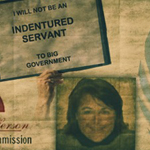 Under pressure from the Jefferson Area Tea Party and other citizen-activists, the Thomas Jefferson Planning District Commission (TJPDC) opened the Livability Partnership (guidance board) as a “mechanism for input” in the $999,000 HUD Sustainable Communities Planning Grant Program. Program (and grant) beneficiaries are Charlottesville City, Albemarle County, and the University of Virginia, who will use the money (through TJPDC) to implement the 1998 Sustainability Accords—a subversive Marxist-themed document which represents a dangerous assault on individual liberty.
Under pressure from the Jefferson Area Tea Party and other citizen-activists, the Thomas Jefferson Planning District Commission (TJPDC) opened the Livability Partnership (guidance board) as a “mechanism for input” in the $999,000 HUD Sustainable Communities Planning Grant Program. Program (and grant) beneficiaries are Charlottesville City, Albemarle County, and the University of Virginia, who will use the money (through TJPDC) to implement the 1998 Sustainability Accords—a subversive Marxist-themed document which represents a dangerous assault on individual liberty.
But, the fox (TJPDC) is guarding the hen house (taxpayer interests). In naming participants of the Livability Partnership, as of July 6, the TJPDC had approved individuals representing 25 “community groups and organizations,” at least 44% of which have direct personal, professional, governmental, or economic ties to one or more of the above designated grant beneficiaries!
Brokering government interests on the Livability Partnership:
Advocates for a Sustainable Albemarle Population
- Policy advisor, and beneficiary of $25,000 (Albemarle County) and $11000 (Charlottesville City) government taxpayer dollars for “sustainable population” study
Albemarle Economic Development Authority
- An entity of Albemarle County government
Albemarle Housing Improvement Program
- Direct recipient of Albemarle County and City taxpayer dollars
- Referenced on Albemarle County web site as a real estate development “partner”
Bike Charlottesville
- Championed by Mayor Dave Norris and a noted “collaborator” with the city of Charlottesville
- Organization recognized by Charlottesville Planning Commission as “Citizen Planner of the Year”
Blue Ridge Care Connection for Children
- Part of University of Virginia Health System (indirect beneficiary of $1 million HUD grant)
Children, Youth & Family Services
- $70k annual beneficiary of City and County Taxpayer financing
Livable for a Lifetime Steering Committee
- Affiliate of JABA (direct recipient of city and county financial support)
- Meets at TJPDC and has City, County, UVa and TJPDC members on committee
Pantops Community Advisory Council
- An official adjunct of Albemarle County Government
Preservation Piedmont
- Stated organization mission is to “serve” City of Charlottesville and Albemarle County
- City Planning Commissioner (Genevieve Keller) on board of directors
- Also, linked on Charlottesville Government web site
Southern Environmental Law Center
- Represented by former Mayor, Democrat Kay Slaughter, on Charlottesville’s Citizens Committee on Environmental Sustainability, charged with implementing the 1998 Sustainability Accords
Virginia Organizing
- Headed by Joe Szakos, executive director. Husband of Charlottesville City Councilor Kristen Szakos.
Will any of these organizations through their designated representatives dare challenge government benefactors? Would they bite the hand that feeds? The answer is obvious. Each organization has a subservient relationship with one or more of the grant awardees. These groups have applied and were appointed solely to promote government interests through participation on the Livability Partnership panel.
Citizens rightfully should demand that accessory organizational beneficiaries of government largess be disqualified from serving on bodies charged with oversight of government-funded processes meant to benefit local governments and politicians. The questionable 44% of TJPDC’s approved appointees represent: a clear, pro-government conflict-of-interest; an egregious abuse of administrative “discretion”; and a flagrant violation of the public trust. They should be removed forthwith.









Your argument here is that local government should not take advice from any group of residents who band together to study the issues at hand, and that these groups of informed local citizens should have no direct personal, professional, employment, or economic ties to the government which allow them to influence government policy in the areas of their expertise. Your argument is that only the ignorant and apathetic have ethical standing to advise the government.
Kens right. I’m tired of lazy, whining conservatives. They ARE ignorant and have no right to participate.
Thank you Rob for bringing this to our attention.
There’s no conflict for organizations that have simply been recognized by government for their contributions. Private orgs that receive some gov funding are more complicated. I’d suggest that orgs receiving more than 30% of their revenue from govs be considered gov extensions.
I agree with Ken that citizen groups with limited relationships to gov should not be excluded. However, even “ignorant and apathetic” people, who are paying for these gov services, have more standing than gov rent seekers.
The Blue Ridge Care Connection for Children and the Economic Development Authority ARE government and are already represented by voting members in the project. This is a clear conflict of interest and their participation as citizen advisors is inappropriate.
James and Folkie, I don’t mean at all to imply that conservatives are ignorant and apathetic, and the audience for Rob’s show would prove me wrong if I did. Nor do I think there is necessarily anything wrong with being ignorant about an issue like this, since there are so many other things responsible citizens have to attend to.
My point is that it’s only natural for government to create ties with groups who know and care most about the issues, and it’s only natural for these groups to seek that support. Where is the ethical conflict on either side? Why should government not seek the advice of the most knowledgeable citizens? If it excluded qualified conservative groups, then you’d have a case.
Are you going to provide such extensive research on the remaining 54% of the membership list?
Yes, since it’s summer, I had plenty of time to do so. The ones listed were those with close ties to government, which was the focus of this report.
And why should people who inform themselves on issues not develop ties with the government so that they, citizens that they are, can influence policy on those issues? It’s summer, so you have plenty of time to answer obvious questions.
I didn’t asking IF you’d preformed the research, I asked if you are going to PROVIDE such extensive research on the remaining 54% of the list.
I also didn’t address the fact that such research result were not included in this report.
Now knowing you have the research, I am curious as to when and where you will be providing the results.
(Not coincidentally), you sound just like an “entitled” government employee. If you want additional research, do it yourself. Since it’s summer, you should have plenty of time to do so, especially on $52k per year.
If you want additional research, do it yourself.
That’s a strange answer for a self-proclaimed community resource. What are you hiding, Rob? And what you didn’t tell your readers is that the TJPDC didn’t just appoint participants in the Livability Project, it invited and continues to invite interested groups to join: “If this project is one you or your organization would like to contribute to, please consider joining the Livability Partnership.”
http://1-community.blogspot.com/2011/06/get-involved-with-livability-project.html
@ken, “My point is that it’s only natural for government to create ties with groups who know and care most about the issues, and it’s only natural for these groups to seek that support. Where is the ethical conflict on either side? Why should government not seek the advice of the most knowledgeable citizens? If it excluded qualified conservative groups, then you’d have a case.” Why do you assume that the groups know or care about “the issues” than anybody else? Usually they are groups who are formed to lobby for their special interests, e.g., the bikers want bike lanes for themselves. They have shown no special knowledge or interests in any other issue.
“Why should government not seek the advice of the most knowledgeable citizens?” Who says they are the most knowledgeable citizens? Did they have to demonstrate that knowledge or just simply apply? Hint: The latter is the correct answer.That kind of thinking brought us to a water supply plan that has not been supported by recent studies. What made the political science major of The Nature Conservancy more knowledgeable than most on water supply, reservoirs and dams? It is unfortunate that local governments appoint special interests groups to its boards and commission with the right to vote. They should always remain in the lobbying position and not in the decision-making position.
The whole idea of including these groups is so that, as with the water supply discussion, those who are in control of the final outcome, can claim that there waqs a great deal of community involvement when, in fact, there was very little.
“If it excluded qualified conservative groups, then you’d have a case.” “
cville eye, it’s common sense. People who have taken time to educate themselves on an issue are most likely to join or form groups to lobby on those issues, and groups who lobby _have_ to know the issues well in order to lobby on them.
The whole idea of including these groups is so that, as with the water supply discussion, those who are in control of the final outcome, can claim that there was a great deal of community involvement when, in fact, there was very little.
First of all, those groups are made up of local citizens, so their participation in the process is by definition community involvement. Secondly, as I showed above, the TJPDC is inviting more community involvement. Third, Rob has refused to tell us which groups comprise the other 54% of the advisory list, which suggests that conservative groups, who as I’ve shown have been invited to participate, are in fact participating.
So once again I note that you have nothing to complain about.
Ken, I’ve not refused to say which groups are participating, I was asked for a “report” on the groups. Here are the groups as of July 6, a document which I initially intended to link to in the story
https://www.schillingshow.com/wp-content/uploads/2011/07/LivabilityPartnershipmembers.pdf
Thank you, Rob. I was mistaken to suggest that you might be hiding something or have refused to tell us which other groups are currently involved. My apologies.
[…] pursuit to implement the 1998 Sustainability Accords in Albemarle County and Charlottesville, the Thomas Jefferson Planning District Commission (TJPDC) has operated as an enemy of free people, threatening individual liberties and property […]